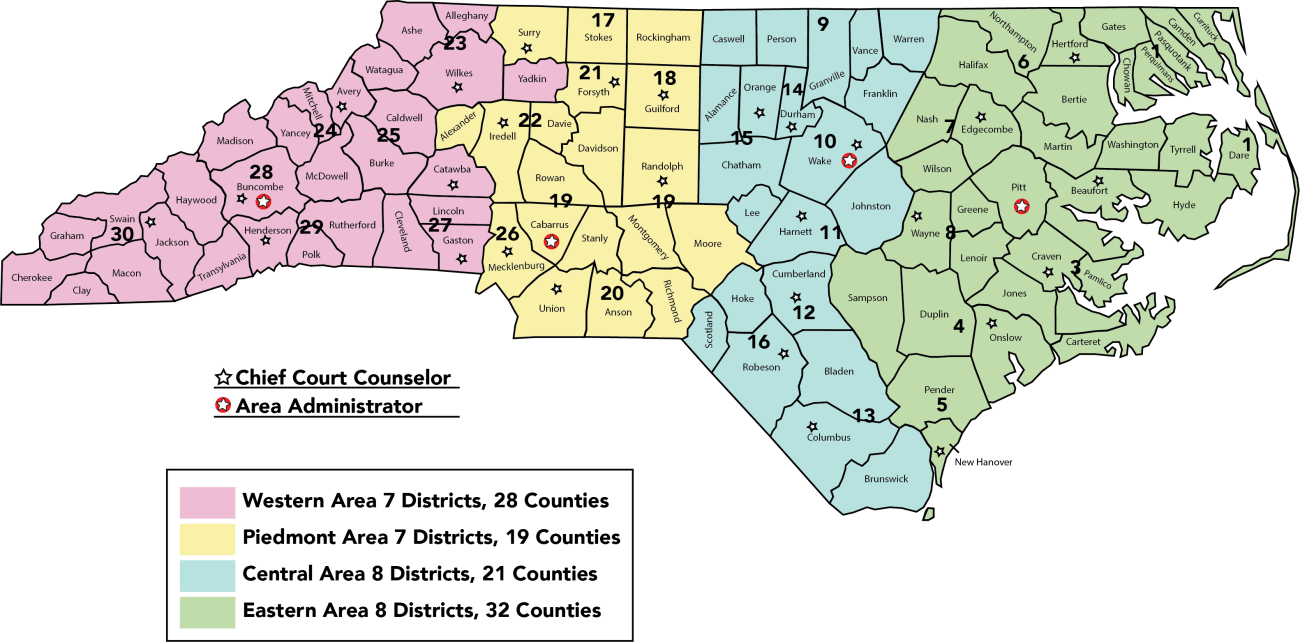- County-based issues get a direct response.
- In-office staffings are available in DSS in all 46 counties.
- In-office staffings are available to DJJ offices in all 15 judicial districts.
- DJJ involvement/engagement as lead staff in Juvenile Justice Behavioral Health Partnerships (JJBH) catchment wide.
- Ongoing DSS presence and presentations regarding information relevant to our DSS partners.
- Collect data on the 3,600 children in foster care and 1,600 adult wards in our region to determine proactive approaches.
- Collaboration with court counselors to prevent more restrictive and costly care for DJJ-involved youth.
DJJ and DSS Relationship
Local Connections to Assist Children and Youth
Trillium maintains direct communications with Departments of Social Services (DSS) and Departments of Juvenile Justice (DJJ) across our region. Having dedicated staff involved with the multiple county DSS offices and various DJJ districts allows Trillium to give them the focused attention needed to best serve the children and youth in our care.

Trillium works with providers in our network who serve justice-involved adults and youth. Please view links below for list of these providers.
Benefits of this relationship include:
- Increase utilization of Multisystemic Therapy (MST®) services throughout our counties.
- Develop innovative solutions to identified gaps or needs involving children and youth.
- Participation in Adult Multidisciplinary Team (MDT) meetings
- Quarterly DSS Director Meetings
- Offer support to DSS staff in both Adult and Child Services
- Co-Responder teams are being implemented with Brunswick, New Hanover, Carteret, Nash, and Pasquotank DSS. .
- Facility-Based Crisis Programs (FBC) for adult populations
- Crisis Respite multi-bed facility in Columbus County
- Adult Multidisciplinary Teams (MDT) throughout our 46 counties
Trillium’s Support, Transition and Reentry (TSTAR) staff work with individuals who were recently incarcerated. Our six Certified Peer Support Specialists have personal histories of incarceration, probation, and navigating the criminal justice system. Visit our TSTAR webpage to learn more.
SB207 and Care Review Meetings
- When the Court orders Juvenile Justice to convene a Care Review Team meeting, the Juvenile Justice Representative completes and submits Care Review form to Care.Review@Trilliumnc.org in order to request a Trillium Representative at this meeting
- This email inbox will be monitored daily (during normal business hours) and Trillium representative will be assigned accordingly to attend Care Review Teams.
Disclaimer
SB207/Care Review Team is an North Carolina law that is in no way connected to the benefits and entitlements or due process rights related to medically necessary services. Trillium is still required to follow clinical coverage policies under the North Carolina Medicaid State Plan; all of those processes remain in place and will continue to be required to be followed for children who have Medicaid coverage.